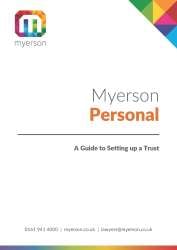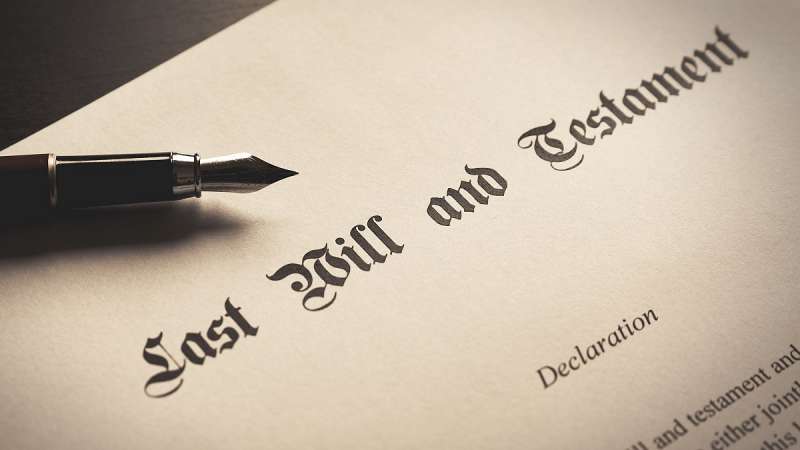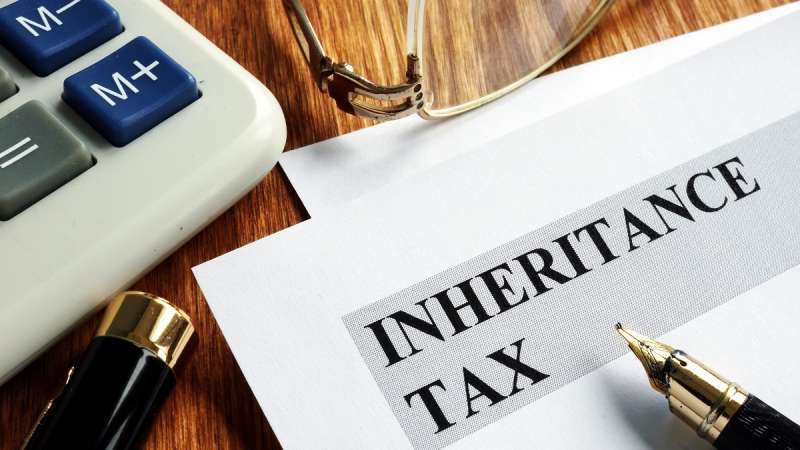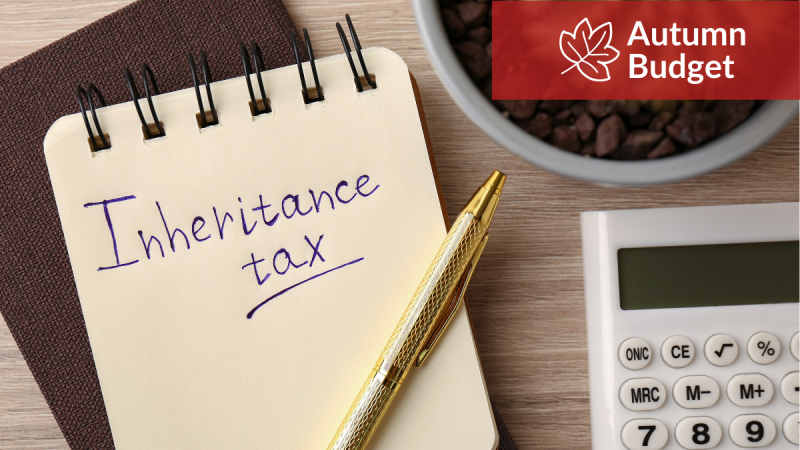Our Trusts Service
Clients often choose to set up trusts for a wide range of personal reasons, each designed to meet specific needs and provide greater control over how assets are managed or distributed.
Whether you're planning for family, financial security, or personal care, we provide clear guidance on the types of trusts available and explain how they can work for you.
We'll also help you navigate the tax aspects, ensuring you understand how different trusts can affect your situation.
Here's how different types of trusts can help:
- For families with children from different relationships: Trusts can help ensure that each child is fairly provided for, protect their future, and avoid potential conflicts.
- For those wanting to keep assets in the family: If you want to ensure your wealth stays within your bloodline, certain trusts can guarantee that your assets pass only to your closest relatives, preserving family legacies.
- For unmarried couples: Trusts can offer significant tax advantages, allowing them to protect each other's financial futures while reducing their tax liabilities.
- For protecting your assets: Discretionary trusts give you flexibility in how your assets are distributed, allowing you to provide for loved ones without exposing those assets to risks like creditors or financial instability.
- For supporting vulnerable or disabled loved ones: Trusts can ensure that vulnerable family members are financially cared for without affecting any government benefits they may receive.
- For tax planning: Strategic use of trusts can help reduce tax burdens and maximise the amount you pass on to your loved ones.
- For managing personal injury compensation: A trust can protect those funds to ensure long-term care and financial security if you or a loved one has received a personal injury settlement.
- For protecting your property: Trusts can safeguard your home or other property, ensuring it remains in your control and is passed on to the chosen people.
- For charitable giving: If supporting a cause close to your heart is important to you, charitable trusts allow you to make a lasting impact while potentially benefiting from tax relief.
- For employees: Employee benefit trusts can help you reward and motivate staff, giving them a share in the company's success while promoting loyalty and satisfaction.
- For retirement: Pension trusts help you secure your future by managing your retirement funds to ensure long-term stability.
- For independent professional oversight: Myerson Trust Corporation serves as an independent trustee, ensuring impartial management of trusts, especially in complex situations or when family dynamics make it difficult to appoint a trustee. The corporation leverages the expertise of all firm departments for tailored specialist advice.
We also work closely with trustees of existing trusts to help them meet their legal obligations and ensure that the trust is being managed effectively.
Myerson Trust Corporation
It is often appropriate to have independent professional Trustees appointed on a trust. This may be due to the value and complexity, or it may be because there are difficult relationships within the family and it is hard to find someone to appoint.
We have formed Myerson Trust Corporation for this purpose and Myerson Trust Corporation is regularly appointed as an independent Trustee. The trust corporation can call on the expertise of any department within the firm as required, so you know that you are always getting tailored specialist advice when Myerson Trust Corporation is appointed.
Our Trusts Expertise
- Advising trustees on compliance, responsibilities, and personal risks.
- Providing detailed guidance on trust-related tax issues.
- Extensive experience in creating and managing trusts to meet your specific needs.
- Experts in trust tax planning and managing trust income.
- Skilled in financial management, tax, and public law related to trusts.
- For more niche planning, access to other experts, such as independent financial Advisors or tax specialists.
- Offering advice on how trusts can protect your assets.
- Specialist teams with the ability to manage both UK and offshore trusts of any size.
Testimonials
Why Choose Myerson's Wills, Trusts, and Probate Team?
- Recognised Expertise: Myerson’s Private Wealth sector proudly holds a Band 2 ranking in the Chambers and Partners High Net Worth Guide, alongside being consistently recognised as a Top Tier law firm by The Legal 500 for the past seven years. As one of the Top 200 UK law firms, Myerson provides exceptional Wills, Trusts, and Probate legal expertise.
- Qualified Professionals: Our team holds additional qualifications in trust administration and tax regimes for trusts, along with the prestigious STEP (Society of Trust and Estate Practitioners) qualification. We have extensive experience setting up and managing live trusts, ensuring we understand the practicalities of trust operation and drafting.
- Comprehensive Support: We provide tailored advice that respects each client's unique circumstances and understands the emotional weight of estate matters. Our solicitors handle sensitive situations with care, offering support throughout the process.
- Holistic Approach: Our holistic strategy allows us to identify tax-saving opportunities and mitigate unexpected liabilities. We ensure clients comprehend the purpose and functioning of trusts, providing city-quality advice at regional prices.
- Partner-Led Service: Our partner-led approach guarantees the best legal advice and commercially minded support. We collaborate with family and property law teams, delivering a comprehensive service that addresses all aspects of estate management.
- Specialist Expertise: Our highly ranked team in The Legal 500 and Chambers for personal tax, trusts, and probate works closely with our contested wills solicitors to provide expert advice tailored to your needs.
- Recognised Leaders: Bik-ki Wong, Head of our Private Client team, has been recognised as one of the top influential private wealth lawyers in Manchester (2023) by Business Today and as one of the best probate and wills lawyers for high-net-worth individuals in the UK (2023) by Spear's.
- Extensive Network: Through our UK200 Group membership, we have strong connections to Independent Financial Advisers (IFAs) and tax advisers, offering comprehensive support tailored to your specific requirements.
- Catering to Diverse Needs: Our team includes fluent Cantonese speakers, ensuring effective communication and understanding in managing estates.
- Look at the Myerson Promise for further benefits of working with us here.
FAQ
What is a Discretionary Trust and why direct funds to it?
A discretionary trust is a trust where you nominate a range of potential beneficiaries (usually spouses, children, and grandchildren). You will appoint trustees who will be in charge of managing the trusts. Who you appoint as trustees will depend on the circumstances and your reasons for using the trust.
The trustees have complete discretion to pay out income and/or capital from the trust to any of the beneficiaries listed at any time. No beneficiary has an automatic right to the funds. They cannot demand funds and not one of the beneficiaries actually owns any of the trust assets. As no one has an entitlement to the assets in the trust (unless the trustees decide that they do), the assets in the trust do not belong to any individual beneficiary and are not inside their estate at death. Similarly, they do not belong to any individual beneficiary if they should get into financial difficulties or get divorced (although assets in trust on divorce may be challenged by a matrimonial court).
Discretionary trusts are used for a variety of reasons including tax-efficiently passing wealth on to grandchildren and further descendants and protecting assets and vulnerable beneficiaries.
This sort of trust can be useful for protection from care fees if an individual leaves assets to a trust instead of the surviving spouse upon death. If the surviving spouse goes into care, the assets in the trust are not within the survivor’s estate and the local authority cannot recoup them towards care fees.
The trust can last for up to 125 years, allowing wealth to be passed down generations. If leaving assets to children directly will simply add to an already taxable estate, you may leave assets to a trust to pass them on to the grandchildren and further descendants.
Many people use trusts where they want a beneficiary to have the benefit of the funds but do not wish them to have control over them. For example, this may be due to the beneficiary being poor at managing money, having issues with addiction or being susceptible to outside influences. This sort of trust can also be used for minors or disabled individuals.
A discretionary trust offers flexibility. As the trustees have control over when funds are used or paid out, they can make the decisions based on the circumstances at the time.
What is the The Nil Rate Band Threshold?
Every individual has an inheritance tax (“IHT”) threshold of £325,000 before any inheritance tax is payable on their estate. There is also no tax to pay on gifts between spouses and it is possible to use the unused nil-rate band of the first spouse to die, against the second spouse’s estate when they die.
If an amount higher than the nil rate band is given to a discretionary trust, then there are inheritance tax implications.
When a trust holds assets to a value of more than £325,000 there is a charge to tax every ten years at a maximum rate of 6% on the assets in the trust which exceeds the inheritance tax threshold at that time. There is a proportionate charge on capital paid out of the trust between ten-year anniversaries.
If you set up a discretionary trust during your lifetime, rather than in your Will, then there will be an immediate charge to IHT at 20% on anything over the £325,000 threshold being transferred into the trust.
Assets that benefit from business property relief do not suffer IHT at any time.
Please note that the new residence nil rate band will not apply where the property is left to a discretionary trust. However, it should be possible to distribute the asset out of the trust to eligible beneficiaries within two years of death. This should therefore not deter people from leaving assets to a discretionary trust if it is a good option for their circumstances. You should ensure that your trustees will get the proper advice at the time so that the trust assets are managed in the most tax-efficient way.
What is Capital Gains Tax (“CGT”)?
From 30 October 2024, trusts pay CGT at a rate of 24% on any gains after applying the Annual Exemption. Trusts have an annual exemption equal to half that of an individual, so this equates to £1,500 (or £3,000 for disabled beneficiaries).
Business Asset Disposal Relief may be applicable in certain circumstances.
Why do I need to be aware of Income Tax?
If the trust is going to receive income, then you need to be aware of the income tax implications. Discretionary trusts pay income tax at the basic rate on their income below £1,000 per annum. Above that, they pay tax at the rate of 45% on the majority of income and 39.35% on dividends.
Beneficiaries who receive income from the trust, and who pay tax at lower rates (or not at all), can reclaim the difference. In addition, if a beneficiary has an entitlement to trust income (which the trustees can decide to create, or revoke), then the share of the trust income which they receive is treated as their own income and taxed accordingly.
What are trustees duties?
Trustee duties are recorded in legislation or confirmed in case law. Trustees are responsible for looking after the assets in the Trust, and Trustees must always act in the best interests of the Trust and act impartially between the Beneficiaries. Trustees have fiduciary duties, which include duties of confidentiality, a duty of no conflict and a duty not to profit from their position. Together with their fiduciary duties, the Trustees owe duties of skill and care. The standard of care depends on whether a Trustee is acting in a professional capacity or not.
As a minimum, the trustees should review the trust every year to check on the trust funds and the needs of the beneficiaries; complete any tax returns and submit them to HMRC and keep trust accounts. Any decisions made should be recorded by way of minutes and trustees’ resolutions. Formal deeds of appointment may have to be drawn up before payments are made to any beneficiary.
How is my money invested in trusts?
As well as complying with a statutory duty of care, Trustees must comply with the relevant provisions relating to investment in the Trustee Act 2000. The TA 2000 gives Trustees the power to make any kind of investment that they could have made if they were absolutely entitled to the assets in the Trust, but this general power does not extend to land. Trustees must review investments from time to time to consider the suitability and diversity of the investments. Trustees should take financial advice from a suitably qualified person.
How is a trust taxed?
The tax treatment depends on the type of Trust. A bare trust is usually transparent for tax purposes and the beneficiary is taxed as if they own the assets. Charitable and offshore trusts have specific rules. Most other trusts will fall within the relevant property trust tax regime. The trust itself does not incur tax; instead, tax may fall on the Trustees, the person creating the Trust and/or the Beneficiaries. The taxes applicable to Trusts are:
- Inheritance Tax (IHT) - potentially on the creation of the Trust, whenever assets are distributed out of the Trust and every 10 years.
- Capital Gains Tax (CGT) – interacts with IHT and hold-over relief may apply.
- Income Tax – applies differently to different categories of the Trust.
- Stamp Duty (SDLT or SDRT)
- Value Added Tax (VAT)
How long can a trust last?
Except for charitable trusts, the law has long prevented people from keeping assets in trusts indefinitely. Any trusts created now are subject to a maximum period of 125 years from the date of creation of Trust. A trust may be set to end when a Beneficiary reaches a certain age, or when a certain event occurs, as long as this within the 125 year period. Older trusts may have different fixed periods and typically it would have been 80 years.
Who can act as a trustee?
In principle, anyone can be a Trustee as long as they are over 18 and have mental capacity to act. A Trustee can be the person creating the Trust who wishes to retain control over the trust assets, a Beneficiary (but keep in mind a potential conflict of interest if there are other beneficiaries who are not trustees), a professional person (they will be the most impartial but will charge for acting), any other individual, a company and/or a limited liability partnership. It is important to choose Trustees carefully and trust that they have the relevant skills to carry out the duties. You should have a minimum of two trustees and a maximum of four. Trustees have to act unanimously so they need to be able to work together.
How can a trust help with inheritance tax planning?
If you survive 7 years from creating a Trust during your lifetime and do not retain any benefit from the trust, then the assets in the Trust will not form part of your estate for IHT purposes on your death. A Trust can be a preferable way to give assets away for IHT purposes without giving the assets outright to beneficiaries who may still be minors or vulnerable as it will allow you to retain control over how the trust assets are dealt with and applied if you also appoint yourself as a Trustee.
Trusts in Wills can also help to mitigate IHT. For example, if you own business assets or agricultural assets, then you could leave these assets into a trust on the first death to maximise the available reliefs and exemptions that will potentially result in an overall IHT saving. The trust can also reduce the value of the estate passing to a surviving spouse which could allow your estate to qualify for other IHT reliefs such as the Residence Nil Rate Band.
How do you set up a Trust?
Trusts can be created without documentation through conduct alone; however, it is best to document the terms of the trust to ensure that there is no ambiguity and to create records for reporting purposes, especially when third parties are involved, for example, HMRC, banks, etc.
The person setting up the trust needs to decide what assets will be placed into trust, who will manage the trust assets (trustees), who will benefit from the trust and when. Most trusts will now have to be registered.
What do I need to consider before setting up a Trust?
Assets can be sold to or gifted into a trust. When considering making a gift, you need to ensure that you will have sufficient funds available for your own needs after the gift has been made. If the gift into trust is to reduce the value of your estate for Inheritance Tax purposes, you must not retain any benefit otherwise, the trust assets will still form part of your estate.
Questions you should consider include what is the purpose of the trust; what type of trust will be suitable; are there tax consequences on transferring into trust and what is the position in relation to ongoing tax; who is suitable to administer the trust; is the cost of setting up a trust proportionate to the benefit?
You should consider what assets are going to be transferred into the trust. Cash is usually easier as investments or property may trigger a transfer for CGT purposes.
Trusts can be a good way of passing down wealth and asset protection and is often used in conjunction with Family Investment companies which are set up with a nominal value.
What tax implications do I need to consider?
Depending on the type of trust being set up and the assets being transferred into the trust, the main taxes are usually Inheritance Tax, Capital Gains Tax, Income Tax and Stamp Duty. If the value of the assets being transferred into a Trust exceed the available Nil Rate Band (currently £325,000), there may be an immediate Inheritance Tax charge of 20% on the balance over and above the Nil Rate Band.
Meet Our Wills, Trusts, and Probate Lawyers
Home-grown or recruited from national, regional or City firms. Our wills, trusts, and probate lawyers are experts in their fields and respected by their peers.
Contact Our Experts
You can contact our lawyers below if you have any more questions or want more information:









